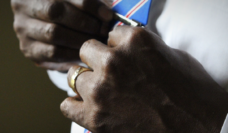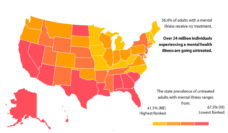What we value drives our behavior. Health is no exception. Several decades ago, Will Courtenay proposed that people use their health behaviors as a way to demonstrate their values. His theory focused on the health behaviors of men because they tend to experience worse health outcomes than women. He suggested that masculinity can be used to demonstrate social power and status. He defined masculinity as a cultural belief that men are more powerful than women, and that masculine power comes from disregarding health and safety at times.
Several researchers have wondered whether all aspects of masculinity contribute to poor health outcomes. For example, Katelyn Sileo and Trace Kershaw wanted to know how specific masculine norms relate to depression and mental health treatment-seeking. They explored these questions among heterosexual men from low income areas between the ages of 18 and 25. They focused on men from low income areas because they are frequently understudied in masculinity research, despite some evidence that they are more likely to stigmatize seeking treatment for mental health problems. Participants in this study were a majority Black or African American, Hispanic or Latino, or multiracial.
The researchers asked participants their history of seeking mental health treatment and how frequently during the past week they experienced depressive symptoms. They also evaluated participants’ views of three frequently valued masculine norms: status-seeking, toughness and anti-femininity.
For messages targeting toughness as a barrier to care, public health professionals could reframe what it means to be tough by highlighting that it is difficult to be physically strong if one’s depression leads to withdrawal and decreased motivation.
Men who valued toughness and anti-femininity were unlikely to seek treatment for depression. Status seekers, on the other hand, experienced less depression and greater treatment-seeking behaviors. Interestingly, status seekers who did not meet depression criteria were the most likely to seek mental health treatment.
Sileo and Kershaw suggest that status seeking is a protective masculine norm, regardless of depressive symptoms. People who want to be recognized for their accomplishments might be more aware of the problems that could hinder their success. These individuals might use preventative services more often to take care of depressive symptoms earlier on before they become a diagnosable disorder, the research speculate.
Valuing toughness and anti-femininity might be risk factors because of the negative connotations associated with seeking treatment for mental health concerns. The authors note that valuing toughness could lead these individuals to hide their symptoms and avoid mental health services. The differences in health behaviors in this group of young men highlights that masculinity can indeed be used as a way to demonstrate power and status.
The authors suggest that these results have important implications for how we approach mental health service engagement. Outreach messages targeting masculine status could emphasize the importance of mental health to achieving one’s goals. For messages targeting toughness as a barrier to care, public health professionals could reframe what it means to be tough by highlighting that it is difficult to be physically strong if one’s depression leads to withdrawal and decreased motivation.
Photo via Getty Images














